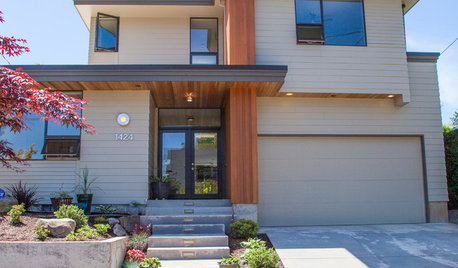Retire or not?
linda_6
7 years ago
Featured Answer
Sort by:Oldest
Comments (35)
Related Discussions
Early retirement and individual health insurance. Where to start?
Comments (3)You would do well by finding a good agent in your area - it doesn't cost you anything. First question is whether you are eligible for any kind of tax credit based on your income. If so, you need to purchase through the New York State market. An agent can assist you with this as well. In terms of individual health plans, you need to determine what kind of health consumer you are. Do you want to maximize individual choice or would you be okay with an HMO with a very restricted network. While it is impossible to predict the future in terms of health - ask yourself what kind of a health consumer you are. If you are reasonably healthy, then you probably are okay with a lower tier - silver versus platinum for example. You can run hypothetical cost estimates based on your health care usage - premium (taking into account any tax credit based on income subsidies); co-pays based on your probable use of doctors; deductible and how it is calculated and then calculate the cap on total out of pocket expense. This is going to be different for each individual. If you have the money to cover the maximum annual out of pocket costs, then perhaps you can save on premiums. If you want to really insure yourself against paying high co-payments and deductible, go with a premium plan. Do you have doctors or hospitals that are critical - that could factor into whether you go with one type of plan or another. It's only for a year and so whatever it costs in terms of your choice, you can change it again next open enrollment....See MoreBuying "up" in house post-retirement
Comments (70)We are both 70ish and were wheeling and dealing to buy and sell. We both wanted a new life and thought that we had found a venue for that new life, but decided at the last minute that we were making a colassal mistake, for our lives. We backed out of the contract and it has cost us money. But, the move was causing hubs so much pain and anxiety that I made the decision that it was not worth if, for any amount of money. I could have done it. But, it was killing him. He looked like a dead man walking. I cant do that to him. He looked as if a load of misery was lifted from him when I approaced him about the elephant in the room, that neither of us was really wanted to move to that place. I still want changes, but not at the expense of him . I felt that, if we moved we could start a new life in our later years. But, the effort needed to fix our current house up and to get all moved in to a place that we really did not just love was too much. It was a wrenching decision. One problem is that there are not many one story family homes being built where we need to be. Everything here that is one story is at least as old as I am and expensive, as well. Another old house that needs repair and a redo? No, just NO. So, I am unpacking and moving back into our house. But there will be changes....See MoreHave decided to retire nearly two years sooner
Comments (47)Well, just did a four hour shift this evening and then submitted my packet. I picked January 13th, which happens to be a Friday. lol. What could go wrong? I was going to pick the end of the month but there are two traning sessions that week and after and I don't want to have to do them and then retire. I'm not sure my file will get processed by the time I stop working but am prepared for that. So relieved....See MoreVery tall stands of perennials at the retirement home garden
Comments (15)Um, I have Bleeding Hearts this year - still a bit small though. Hoping they look good with the salvia coccinea, zinnia and tithonia (but suspect it will all be a bit of a mish-mash. A mostly annual bed though so will see how well they do - most of these helianthus/heliopsis/yellow daisies start off well but straggle out by July cos lean stony soil, dry climate....See MoreLindsey_CA
7 years agolinda_6
7 years agolinda_6
7 years agochisue
7 years agoElmer J Fudd
7 years agoElmer J Fudd
7 years agolast modified: 7 years agolinda_6
7 years agoElmer J Fudd
7 years agolast modified: 7 years agoKaillean (zone 8, Vancouver)
7 years agolast modified: 7 years agoUser
7 years agoElmer J Fudd
7 years agolast modified: 7 years agoeld6161
7 years agolast modified: 7 years agoLucyStar1
7 years agogolfergrrl
7 years agojemdandy
7 years agoMichael
7 years agolast modified: 7 years agolinda_6
7 years agolinda_6
7 years agochisue
7 years agojoyfulguy
7 years agolinda_6
7 years agolast modified: 7 years agoElmer J Fudd
7 years agotbenjr
7 years agolast modified: 7 years agochisue
7 years agoUser
7 years agoMichael
7 years agoOklaMoni
7 years agowildchild2x2
7 years ago
Related Stories

LIFERetirement Reinvention: Boomers Plot Their Next Big Move
Choosing a place to settle in for the golden years? You're not alone. Where boomers are going and what it might look like
Full Story
HOUZZ TOURSWe Can Dream: Rural Retirement Home a Haven of Beauty and Tranquillity
A retired couple builds a spacious Japanese-inspired indoor-outdoor sanctuary to enjoy with extended family
Full Story
REMODELING GUIDESWhen Retirement Came Early, a Couple Headed for the Hills
A Seattle pair turn their part-time home into a full-time one, remodeling it to gain views and help it stand up to snow, sun and wind
Full Story
HOUZZ TOURSHouzz Tour: Prairie Grain Bin Turned Bucolic Retirement Home
An agrarian structure and a big dream combine in this one-of-a-kind home that celebrates 250 acres of Montana grasslands
Full Story
HOUZZ TOURSHouzz Tour: Retiring to a Midcentury Modern Gem
Vintage furniture fits the tone of this 1950s home, designed by modernist A. Quincy Jones, to a T
Full Story
HOUZZ TOURSMy Houzz: A Portland Couple Builds Their Dream Retirement Home
An Oregon couple emphasizes indoor-outdoor living and accessible design in their energy-efficient, visitor-friendly house
Full Story0

HOMES AROUND THE WORLDHouzz Tour: Retired Soldier Creates Her Dream Home in Sweden
A Swedish family's fantasy of a rural retreat becomes a reality after years of renovations
Full Story
CRAFTSMAN DESIGNHouzz Tour: Happiness Reigns in a Seattle Home
A newly retired couple remodel their home to make it more beautiful, energy efficient and accessible
Full Story
HOUZZ TOURSMy Houzz: A Condo of Delightful Curiosities in Louisville
Gorgeous vintage finds and eclectic repurposed pieces shine in this dream renovated retirement home
Full Story
CONTEMPORARY HOMESHouzz Tour: Coastal New England Style Meets Pacific Northwest Modern
Homeowners ease into retirement in this Camano Island home, enjoying seaside views, cooking and gardening
Full Story


dees_1